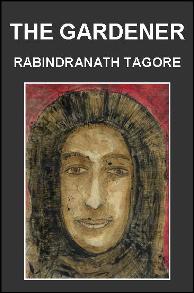| Free Jyotish Newsletter |
 Jyotish.ws
Jyotish.wsBook Review: Lovely Blooms in Rabindranath Tagore's "The Gardener"
Review by Steven Rothbard
 The poetry of Rabindranath Tagore was written in Bengali, but we are lucky to have good translators for many of his books, and Tagore himself made a translation of his book The Gardener, published in 1913, and available online on The Spiritual Bee. Robert Frost said that "Poetry is what gets lost in translation," and to translate poetry, the translator should also be a poet , but for a poet such as Tagore who wrote in a language distant from English, it's important that he translated his book himself. The results are very impressive.
The poetry of Rabindranath Tagore was written in Bengali, but we are lucky to have good translators for many of his books, and Tagore himself made a translation of his book The Gardener, published in 1913, and available online on The Spiritual Bee. Robert Frost said that "Poetry is what gets lost in translation," and to translate poetry, the translator should also be a poet , but for a poet such as Tagore who wrote in a language distant from English, it's important that he translated his book himself. The results are very impressive.
Tagore's verse reminds one of both Whitman and Shelley, as well as such other ecstatic poets as Kabir and Mira Bai. He must certainly have been influenced by the later two as well as by others from the Indian tradition. Interestingly, it constantly seems both "modern" and "conservative" at once, and certainly is frequently very great. The Austrian composer Zemlinsky thought enough of it to set seven of the poems from this book in his Lyric Symphony of 1923.
The Gardener begins with a kind of invocation to the muse in which a servant of a queen begs her to make him her gardener as well as her court poet who will ensure that she is always adorned with the most lovely and freshest blooms from the scented garden. The love and veneration of the servant for the queen gets him the post he longs for; it may be the prayer of the writer to Goddess Saraswati or of a devotee to Lakshmi, but whatever your interpretation, the Queen finally says, "Your prayers are granted, my servant; you will be the gardener of my flower garden." This is clearly a spiritual poem in the guise of a love lyric. For Western readers, this must have been a new thing. To Tagore, there is no separation between body and spirit; both are equally beautiful and real. In poem 15, the speaker says, "From my heart comes out and dances the image of my own desire./The gleaming vision flits on./I try to clasp it firmly, it eludes me and leads me astray./I seek what I cannot get, I get what I do not seek." A beautiful image of the ignorance of desiring. Be careful what you wish for, or as Oscar Wilde said, "There are only two tragedies in life: one is not getting what one wants, and the other is getting it."
In poem 3, mysterious images may puzzle the reader as they do the speaker's love. It begins: "In the morning I cast my net into the sea.'' Clearly an image of deep meditation (seen even in Melville's Moby Dick), it continuous: "I dragged up from the dark abyss things of strange aspect and strange beauty," but the lady merely says "'What strange things are these? I know not of what use they are!'" The speaker ends by throwing them all into the street, where strangers take them "into far countries." The girl has a superficial mind which misses the great value of these "things of...strange beauty." This is a clear image of readers who stay on the surface and miss the great value of what's in front of them.
There are so many examples of Tagore's fine writing here that one can hardly give the reader a true idea of the riches in this little book, but here are a few. In Poem 16, the speaker weaves his wreath with "Your veil of the saffron colour makes my eyes drunk./The jasmine wreath that you wove me thrills to my heart like praise." He then reaches even greater heights when "We do not stray out of all worlds into the ever silent; we do not raise our hands to the/void for things beyond hope./It is enough what we give and we get./We have not crushed the joy to the utmost to wring from it the wine of pain./This love between you and me is simple as a song."
In Poem 17, "The yellow bird sings in her tree and makes my heart dance with gladness." Poems 19-23 seem to form a little story of a girl who "walked by the riverside path with the full pitcher upon your hip./Why did you swiftly turn your face and peep at me through your fluttering veil?" In Poem 23, the image comes again in "Why do you sit there and jingle your bracelets in mere idle sport?/Fill your pitcher. It is time for you to come home." For the poet, it is always "the time for you to come home."
This book is in the public domain. Click to download.
(c) copyright 2016 Michael Laughrin
From the June/July 2016 issue of Michael Laughrin's North American Jyotish Newsletter. Click to subscribe to this free Jyotish newsletter.
Read more articles.
Yagyas offered by Michael Laughrin.